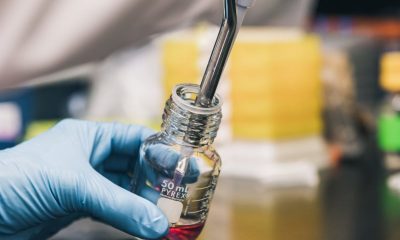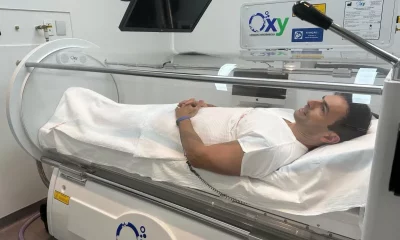
Scientists look at drugs to slow bone and muscle aging in people with HIV
Follow Us @
Scientists look at drugs to slow bone and muscle aging in people with HIV
scientists from University of Augustain the United States, are looking at drugs studied in cancer clinical trials to help slow the aging of bones and muscles in people with HIV.
You antiretroviral cocktails, used in the treatment of the disease, prevent the process of viral replication, making the virus undetectable and transmissible, in addition to also reducing the viral load. However, both the virus and the treatment can accelerate the aging of bones and muscleswhich is why American researchers are studying ways to slow down this process.
Meghan McGee-Lawrencea biomedical engineer at the University of Augusta, said in a statement that “these drugs are doing what they are supposed to, they are extending the shelf life.” Now, said the engineer, “what we need to do is deal with the side effects so that you can extend the health time and lifespan”.
Scientists study the tryptophan, an essential amino acid, important for metabolism. A indoleamine It is a natural enzyme that helps break down tryptophan into usable products such as kynurenine, which is associated with producing fuel for our cells. With age, tryptophan levels tend to decline, while indoleamine levels increase.
This process results in an increased conversion of available tryptophan to kynurenine, which is known to activate the aryl hydrocarbon receptor (AhR). Typically, the AhR has a very global role, helping to sense what is going on in the body’s environment and making necessary adjustments, including in immune response and gene expression, glucose regulation and toxin removal. According to scientists, thisreceptor is already highly expressed in bone and muscle cells and is thought to play a key role in aging and lifespan”.
With the higher kynurenine production, the higher levels of destructive oxidative stress produced, which damages cellular power plants so our cells don’t get all the energy they need, increases inflammation and generally ages our bones and muscles.
Scientists analyze drugs to slow the aging of bones and muscles of people with HIV (Photo: Reproduction / Pixabay)
Researchers have also recently realized that these age-related dynamics can increase oxidative stress and induce the aging process, called senescence, in bone marrow stem cells that produce bone and muscle cells. With senescence, cells do not normally die, but stop functioning optimally or their function may change and they may start to secrete many inflammatory factors. The problems with oxidative stress and senescence probably result from antiretroviral drugs affecting the cell’s power plants, or mitochondria, so they don’t work efficiently.
Second Hamrick, University aging specialist, the end result “is the acceleration of aging by about a decade, noting that other aspects such as cognitive decline also seem to be affected.” The specialist also states that, despite the clear effectiveness of current antiretrovirals against HIV, there is still a level of inflammation in patients that seems to be increasing kynurenine levels.
Therefore, experts are looking for ways to intervene in the composition process that weakens the organism at an early stage. They have evidence that, for example, markers of muscle atrophy, bone loss and AhR activation are all increased in their mouse model of HIV infection. On the other hand, they have early evidence that eliminating AhR or inhibiting it with drugs increases muscle and bone health and strength in animal tests. They are looking at both the impact of indoleamine inhibitors and drugs that directly inhibit AhR.
The new studies also test the leading hypothesis that excessive AhR activation is the key to bone and muscle loss that occurs with aging and to the acceleration of problems with HIV infection and treatment.
“We hope to identify some new targets for preventing muscle and bone loss with aging.”, said the scientist.
The researchers hope their work will help tweak existing drugs to reduce their effects that contribute to aging or provide an adjuvant therapy for people with HIV that stops accelerated aging.
Featured Photo: Remedies. Playback/Pixabay.
Scientists look at drugs to slow bone and muscle aging in people with HIV
Follow AFRILATEST on Google News and receive alerts for the main news about celebrities, soap operas, series, entertainment and more!
SHARE POST AND EARN REWARDS:
Join our Audience reward campaign and make money reading articles, shares, likes and comment >> Join reward Program
FIRST TIME REACTIONS:
Be the first to leave us a comment, down the comment section. click allow to follow this topic and get firsthand daily updates.
JOIN US ON OUR SOCIAL MEDIA: << FACEBOOK >> | << WHATSAPP >> | << TELEGRAM >> | << TWITTER >
#Scientists #drugs #slow #bone #muscle #aging #people #HIV
-
Good News TV series2 months ago
Justin Bieber and Hailey go to church using a powerful car
-
News2 months ago
Harry decides to appeal after loss of police protection in the UK
-
Good News TV series2 months ago
Preta Gil is the new presenter of TVZ on Multishow
-
Good News TV series2 months ago
Fuzuê: Pascoal is sentenced to more than 70 years in prison
-
News2 months ago
Viradouro wins the Rio de Janeiro Carnival title in 2024 now news
-
Health and Fitness2 months ago
Hyperbaric Oxygenation accelerates recovery from knee injuries, according to USP study
-
Culture2 months ago
the Sub4 Turismo package that we recommend and we go (on the 42 km)
-
Good News TV series2 months ago
Cris discovers Isis's pregnancy. And now?











































